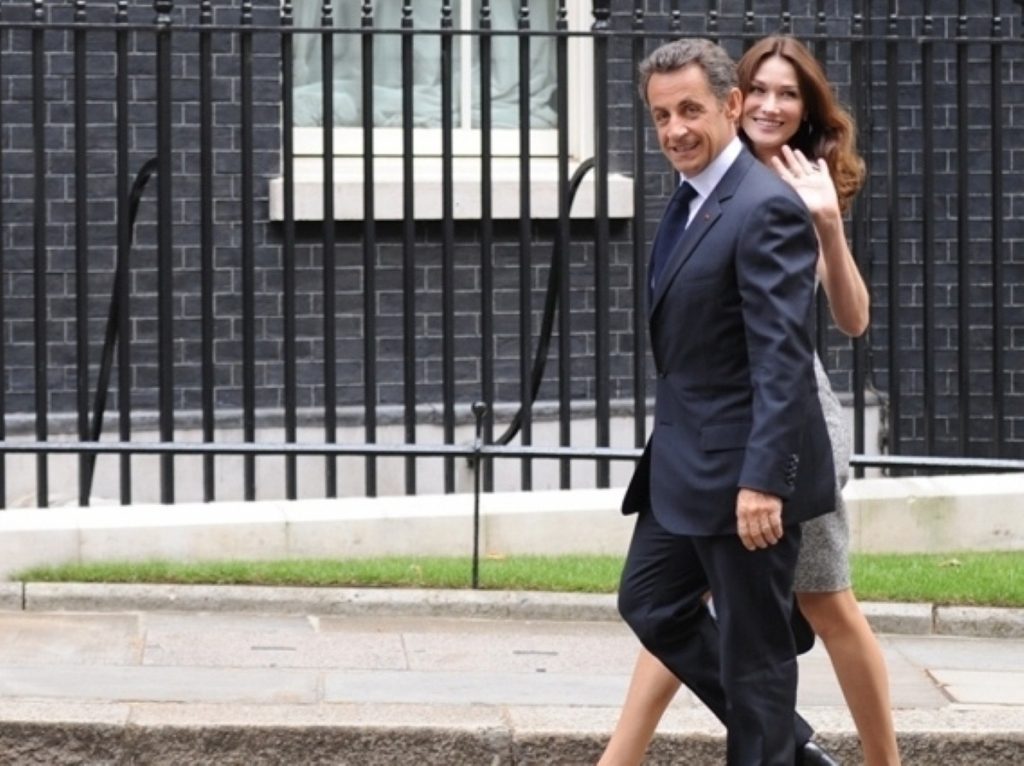Sarkozy and Cameron celebrate de Gaulle’s ‘Free France’ appeal
By politics.co.uk staff
Nicolas Sarkozy joined with David Cameron today to pay tribute to Charles de Gaulle’s historic wartime radio appeal to his French compatriots today, 70 years after it was delivered.
The appeal, which was broadcast on the BBC French Service, was heard by pitifully few men and women in France at the time, but went on to become a rallying call, sparking the French resistance and galvanising those across the Channel who refused to accept defeat to the Nazis.
The French president arrived in London earlier with his Italian supermodel/pop star wife Carla Bruni.


It is the first time the couple have come to Britain since their trip in March 2008, which transfixed the press on both sides of the Channel.
They visited the BBC studios where the broadcast was taped before unveiling a plaque. The couple also saw a tapestry gifted to the BBC by France at the end of world war two.
The French president then joined Prince Charles to law a wreath at the statue of George VI on the Mall and another at the statue of General de Gaulle in Carlton Gardens.
The Eurostar laid on a special service for veterans today, with leaders meeting French resistance fighters alongside British veterans at an event at the Chelsea Royal Hospital, home of the Chelsea pensioners.
“We are not just neighbours in the geographical sense, but also in the emotional sense,” the prime minister said.
“The bonds between our countries have been forged in great trials, through two world wars, from the trenches of Ypres to the beaches of Normandy.”
Mr Cameron said he was “proud” to see UK and French troops fighting together in Afghanistan.
“Today is not just about our shared history but our shared responsibilities and shared future,” he concluded before introducing President Sarkozy as “mon ami”.
The French president said: “Today it is our responsibility in Europe to make our history, our power, a common instrument to protect democracy everywhere in the world, as we always did, and we are still doing.
“Great Britain and France will be faithful to those who died for them in the skies above the London, the deserts of Libya, the beaches of Normandy and the fields of Alsace.
“In commemorating this date the British and French remember their unity has always been the condition of their survival… long live France, and long live Great Britain.”
At lunch with their wives later, the two men cemented their personal relationships and talked football.
“The prime minister and the president had an opportunity to swap notes on the progress of their respective teams in the World Cup,” Mr Cameron’s spokesman said.
The general had fled his country just days before a peace agreement was signed with the Nazis, under the orders of Philippe Petain.
At the time of the broadcast, senior British figures were unsure of whether to allow the general to issue his call to arms, as many felt there was still some chance the agreement would not go through. But Winston Churchill insisted, and then allowed for a further broadcast a few days later.
General de Gaulle, an unknown figure at the time, declared himself leader of “Free France” in the transmission.
“The flame of the French resistance must not and will not be extinguished,” he told listeners.
At the time, very few of the people listening would have had had any idea what he looked like. But by the time he returned to France after the end of hostilities, he was given a heroes welcome.
Charles de Gaulle’s L’Appel du 18 Juin in full:
“The leaders who, for many years, have been at the head of the French armies have formed a government. This government, alleging the defeat of our armies, has made contact with the enemy in order to stop the fighting. It is true, we were, we are, overwhelmed by the mechanical, ground and air forces of the enemy. Infinitely more than their number, it is the tanks, the airplanes, the tactics of the Germans which are causing us to retreat. It was the tanks, the airplanes, the tactics of the Germans that surprised our leaders to the point of bringing them to where they are today.
“But has the last word been said? Must hope disappear? Is defeat final? No!
“Believe me, I who am speaking to you with full knowledge of the facts, and who tell you that nothing is lost for France. The same means that overcame us can bring us victory one day. For France is not alone! She is not alone! She is not alone! She has a vast Empire behind her. She can align with the British Empire that holds the sea and continues the fight. She can, like England, use without limit the immense industry of the United States.
“This war is not limited to the unfortunate territory of our country. This war is not over as a result of the Battle of France. This war is a worldwide war. All the mistakes, all the delays, all the suffering, do not alter the fact that there are, in the world, all the means necessary to crush our enemies one day. Vanquished today by mechanical force, in the future we will be able to overcome by a superior mechanical force. The fate of the world depends on it.
“I, General de Gaulle, currently in London, invite the officers and the French soldiers who are located in British territory or who might end up here, with their weapons or without their weapons, I invite the engineers and the specialised workers of the armament industries who are located in British territory or who might end up here, to put themselves in contact with me.
“Whatever happens, the flame of the French resistance must not be extinguished and will not be extinguished. Tomorrow, as today, I will speak on the radio from London.”

